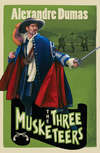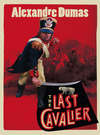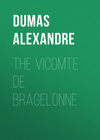Read the book: «The Wolf-Leader», page 14
Thibault uttered an oath: “If I ever meet you, Monsieur Comte de Mont-Gobert,” he said, “I swear that I will hamstring you, as you have hamstrung this poor beast!”
Then he rushed out of the little building, and remembering the way he had come, turned in the direction of the breach in the wall, and walking quickly towards it, found it, climbed over the stones, and was again outside the park. But his further passage was barred, for there in front of him was the figure of a man, who stood waiting, with a drawn sword in his hand. Thibault recognised the Comte de Mont-Gobert, the Comte de Mont-Gobert thought he recognised Raoul de Vauparfond.
“Draw, Baron!” said the Count; further explanation was unnecessary. Thibault, on his side, equally enraged at having the prey, on which he had already set tooth and claw, snatched away from him, was as ready to fight as the Count. He drew, not his sword, but his hunting-knife, and the two men crossed weapons.
Thibault, who was something of an adept at quarter-staff, had no idea of fencing; what was his surprise therefore, when he found, that he knew by instinct how to handle his weapon, and could parry and thrust according to all the rules of the art. He parried the first two or three of the Count’s blows with admirable skill.
“Ah, I heard, I remember,” muttered the Count between his clenched teeth, “that at the last match you rivalled Saint-Georges himself at the foils.”
Thibault had no conception who Saint-Georges might be, but he was conscious of a strength and elasticity of wrist, thanks to which he felt he might have rivalled the devil himself.
So far, he had only been on the defensive; but the Count having aimed one or two unsuccessful lunges at him, he saw his opportunity, struck out, and sent his knife clean through his adversary’s shoulder. The Count dropped his sword, tottered, and falling on to one knee, cried “Help, Lestocq!”
Thibault ought then to have sheathed his knife and fled; but, unfortunately, he remembered the oath he had taken as regards the Count, when he had found that his horse had been hamstrung. He slipped the sharp blade of his weapon under the bent knee and drew it towards him; the Count uttered a cry; but as Thibault rose from his stooping posture, he too felt a sharp pain between his shoulder-blades, followed by a sensation as of extreme cold over the chest, and finally the point of a weapon appeared above his right breast. Then he saw a cloud of blood, and knew no more. Lestocq, called to his master’s aid as the latter fell, had run to the spot, and, as Thibault rose from hamstringing the Count, had seized that moment to dig his hunting knife into his back.
CHAPTER XVIII
DEATH AND RESURRECTION
THE cold morning air brought Thibault back to consciousness; he tried to rise, but the extremity of his pain held him bound. He was lying on his back, with no remembrance of what had happened, seeing only the low grey sky above him. He made another effort, and turning managed to lift himself on his elbow. As he looked around him, he began to recall the events of the previous night; he recognised the breach in the wall; and then there came back to him the memory of the love meeting with the Countess and the desperate duel with the Count. The ground near him was red with blood, but the Count was no longer there; no doubt, Lestocq, who had given him this fine blow that was nailing him to the spot, had helped his master indoors; Thibault they had left there, to die like a dog, as far as they cared. He had it on the tip of his tongue to hurl after them all the maledictory wishes wherewith one would like to assail one’s cruellest enemy. But since Thibault had been no longer Thibault, and indeed during the remainder of the time that he would still be the Baron Raoul, or at least so in outward appearance, his demoniacal power had been and would continue in abeyance.
He had until nine o’clock that evening; but would he live till then? This question gave rise in Thibault to a very uneasy state of mind. If he were to die before that hour, which of them would die, he or the Baron? It seemed to him as likely to be one as the other. What, however, disturbed and angered him most was his consciousness that the misfortune which had befallen him was again owing to his own fault. He remembered now that before he had expressed the wish to be the Baron for four and twenty hours, he had said some such words as these:
“I should laugh, Raoul, if the Comte de Mont-Gobert were to take you by surprise; you would not get off so easily as if he were the Bailiff Magloire; there would be swords drawn, and blows given and received.”
At last, with a terrible effort, and suffering the while excruciating pain, Thibault succeeded in dragging himself on to one knee. He could then make out people walking along a road not far off on their way to market, and he tried to call to them, but the blood filled his mouth and nearly choked him. So he put his hat on the point of his knife and signalled to them like a shipwrecked mariner, but his strength again failing, he once more fell back unconscious. In a little while, however, he again awoke to sensation; he appeared to be swaying from side to side as if in a boat. He opened his eyes; the peasants, it seemed, had seen him, and although not knowing who he was, had had compassion on this handsome young man lying covered with blood, and had concocted a sort of hand-barrow out of some branches, on which they were now carrying him to Villers-Cotterets. But by the time they reached Puiseux, the wounded man felt that he could no longer bear the movement, and begged them to put him down in the first peasant’s hut they came to, and to send a doctor to him there. The carriers took him to the house of the village priest, and left him there, Thibault before they parted, distributing gold among them from Raoul’s purse, accompanied by many thanks for all their kind offices. The priest was away saying mass, but on returning and finding the wounded man, he uttered loud cries of lamentation.
Had he been Raoul himself, Thibault could not have found a better hospital. The priest had at one time been Curé of Vauparfond, and while there had been engaged to give Raoul his first schooling. Like all country priests, he knew, or thought he knew, something about doctoring; so he examined his old pupil’s wound. The knife had passed under the shoulder-blade, through the right lung, and out between the second and third ribs.
He did not for a moment disguise to himself the seriousness of the wound, but he said nothing until the doctor had been to see it. The latter arrived and after his examination, he turned and shook his head.
“Are you going to bleed him?” asked the priest.
“What would be the use?” asked the doctor. “If it had been done at once after the wound was given, it might perhaps have helped to save him, but it would be dangerous now to disturb the blood in any way.”
“Is there any chance for him?” asked the priest, who was thinking that the less there was for the doctor to do, the more there would be for the priest.
“If his wound runs the ordinary course,” said the doctor, lowering his voice, “he will probably not last out the day.”
“You give him up then?”
“A doctor never gives up a patient, or at least if he does so, he still trusts to the possibility of nature mercifully interfering on the patient’s behalf; a clot may form and stop the hemorrhage; a cough may disturb the clot, and the patient bleed to death.”
“You think then that it is my duty to prepare the poor young man for death,” asked the curate.
“I think,” answered the doctor, shrugging his shoulders, “you would do better to leave him alone; in the first place because he is, at present, in a drowsy condition and cannot hear what you say; later on, because he will be delirious, and unable to understand you.” But the doctor was mistaken; the wounded man, drowsy as he was, overheard this conversation, more re-assuring as regards the salvation of his soul than the recovery of his body. How many things people say in the presence of sick persons, believing that they cannot hear, while all the while, they are taking in every word! In the present case, this extra acuteness of hearing may perhaps have been due to the fact that it was Thibault’s soul which was awake in Raoul’s body; if the soul belonging to it had been in this body, it would probably have succumbed more entirely to the effects of the wound.
The doctor now dressed the wound in the back, but left the front wound uncovered, merely directing that a piece of linen soaked in iced water should be kept over it. Then, having poured some drops of a sedative into a glass of water, and telling the priest to give this to the patient whenever he asked for drink, the doctor departed, saying that he would come again the following morning, but that he much feared he should take his journey for nothing.
Thibault would have liked to put in a word of his own, and to say himself what he thought about his condition, but his spirit was as if imprisoned in this dying body, and, against his will, was forced to submit to lying thus within its cell. But he could still hear the priest, who not only spoke to him, but endeavoured by shaking him to arouse him from his lethargy. Thibault found this very fatiguing, and it was lucky for the priest that the wounded man, just now, had no superhuman power, for he inwardly sent the good man to the devil, many times over.
Before long it seemed to him that some sort of hot burning pan was being inserted under the soles of his feet, his loins, his head; his blood began to circulate, then to boil, like water over a fire. His ideas became confused, his clenched jaws opened; his tongue which had been bound became loosened; some disconnected words escaped him.
“Ah, ah!” he thought to himself, “this no doubt is what the good doctor spoke about as delirium;” and, for the while at least, this was his last lucid idea.
His whole life – and his life had really only existed since his first acquaintance with the black wolf – passed before him. He saw himself following, and failing to hit the buck; saw himself tied to the oak-tree, and the blows of the strap falling on him; saw himself and the black wolf drawing up their compact; saw himself trying to pass the devil’s ring over Agnelette’s finger; saw himself trying to pull out the red hairs, which now covered a third of his head. Then he saw himself on his way to pay court to the pretty Madame Polet of the mill, meeting Landry, and getting rid of his rival; pursued by the farm servants, and followed by his wolves. He saw himself making the acquaintance of Madame Magloire, hunting for her, eating his share of the game, hiding behind the curtains, discovered by Maître Magloire, flouted by the Baron of Vez, turned out by all three. Again he saw the hollow tree, with his wolves couching around it and the owls perched on its branches, and heard the sounds of the approaching violins and hautboy and saw himself looking, as Agnelette and the happy wedding party went by. He saw himself the victim of angry jealousy, endeavouring to fight against it by the help of drink, and across his troubled brain came the recollection of François, of Champagne, and the Inn-keeper; he heard the galloping of Baron Raoul’s horse, and he felt himself knocked down and rolling in the muddy road. Then he ceased to see himself as Thibault; in his stead arose the figure of the handsome young rider whose form he had taken for a while. Once more he was kissing Lisette, once more his lips were touching the Countess’s hand; then he was wanting to escape, but he found himself at a cross-road where three ways only met, and each of these was guarded by one of his victims: the first, by the spectre of a drowned man, that was Marcotte; the second, by a young man dying of fever on a hospital bed, that was Landry; the third, by a wounded man, dragging himself along on one knee, and trying in vain to stand up on his mutilated leg, that was the Comte de Mont-Gobert.
He fancied that as all these things passed before him, he told the history of them one by one, and that the priest, as he listened to this strange confession, looked more like a dying man, was paler and more trembling than the man whose confession he was listening to; that he wanted to give him absolution, but that he, Thibault, pushed him away, shaking his head, and that he cried out with a terrible laugh: “I want no absolution! I am damned! damned! damned!”
And in the midst of all this hallucination, this delirious madness, the spirit of Thibault could hear the priest’s clock striking the hours, and as they struck he counted them. Only this clock seemed to have grown to gigantic proportions and the face of it was the blue vault of heaven, and the numbers on it were flames; and the clock was called eternity, and the monstrous pendulum, as it swung backwards and forwards called out in turn at every beat: “Never! For ever!” And so he lay and heard the long hours of the day pass one by one; and then at last the clock struck nine. At half past nine, he, Thibault, would have been Raoul, and Raoul would have been Thibault, for just four and twenty hours. As the last stroke of the hour died away, Thibault felt the fever passing from him, it was succeeded by a sensation of coldness, which almost amounted to shivering. He opened his eyes, all trembling with cold, and saw the priest at the foot of the bed saying the prayers for the dying, and the hands of the actual clock pointing to a quarter past nine.
His senses had become so acute, that, imperceptible as was their double movement, he could yet see both the larger and smaller one slowly creeping along; they were gradually nearing the critical hour; half past nine! Although the face of the clock was in darkness, it seemed illuminated by some inward light. As the minute hand approached the number 6, a spasm becoming every instant more and more violent shook the dying man; his feet were like ice, and the numbness slowly, but steadily, mounted from the feet to the knees, from the knees to the thighs, from the thighs to the lower part of the body. The sweat was running down his forehead, but he had no strength to wipe it away, nor even to ask to have it done. It was a sweat of agony which he knew every moment might be the sweat of death. All kinds of strange shapes, which had nothing of the human about them, floated before his eyes; the light faded away; wings as of bats seemed to lift his body and carry it into some twilight region, which was neither life nor death, but seemed a part of both. Then the twilight itself grew darker and darker; his eyes closed, and like a blind man stumbling in the dark, his heavy wings seemed to flap against strange and unknown things. After that he sank away into unfathomable depths, into bottomless abysses, but still he heard the sound of a bell.
The bell rang once, and scarcely had it ceased to vibrate when the dying man uttered a cry. The priest rose and went to the side of the bed; with that cry the Baron Raoul had breathed his last: it was exactly one second after the half hour after nine.
CHAPTER XIX
THE DEAD AND THE LIVING
AT the same moment that the trembling soul of the young Baron passed away, Thibault, awaking as if from an agitated sleep full of terrible dreams, sat up in his bed. He was surrounded by fire, every corner of his hut was in flames; at first he thought it was a continuation of his nightmare, but then he heard cries of, “Death to the wizard! death to the sorcerer! death to the were-wolf!” and he understood that some terrible attack was being made upon him.
The flames came nearer, they reached the bed, he felt their heat upon him; a few seconds more and he would be burned alive in the midst of the flaming pile. Thibault leaped from his bed, seized his boar-spear, and dashed out of the back door of his hut. No sooner did his enemies see him rush through the fire and emerge from the smoke than their cries of “death to him!” “death!” were redoubled. One or two shots were fired at him; Thibault heard the bullets whizz past; those who shot at him wore the livery of the Grand Master, and Thibault recalled the menace of the lord of Vez, uttered against him a few days before.
He was then beyond the pale of the law; he could be smoked out of his hole like a fox; he could be shot down like a buck. Luckily for Thibault, not one of the bullets struck him, and as the circle of fire made by the burning hut was not a large one, he was soon safely beyond it, and once again in shelter of the vast and gloomy forest, where, had it not been for the cries of the menials who were burning down his house, the silence would have been as complete as the darkness. He sat down at the foot of a tree and buried his head in his hands. The events of the last forty-eight hours had succeeded each other with such rapidity, that there was no lack of matter to serve as subjects of reflection to the shoe-maker.
The twenty-four hours, during which he had lived another existence than his own, seemed to him like a dream, so much so, that he would not have dared to take his oath that all this recent affair between the Baron, and the Countess Jane, and the Comte de Mont-Gobert had really taken place. The church clock of Oigny struck ten, and he lifted his head. Ten o’clock! and only half-an-hour before he had been still in the body of the Baron Raoul, as he lay dying in the house of the Curé of Puiseux.
“Ah!” he exclaimed “I must find out for certain what has happened! It is not quite three miles to Puiseux and I shall be there in half-an-hour; I should like to ascertain if the Baron is really dead.” A melancholy howl made answer to his words; he looked round; his faithful body-guards were back again; he had his pack about him once more.
“Come, wolves! come, my only friends!” he cried, “let us be off!” And he started with them across the forest in the direction of Puiseux. The huntsmen of the Lord of Vez, who were poking up the remaining embers of the ruined hut, saw a man pass, as in a vision, running at the head of a dozen or more wolves. They crossed themselves, and became more convinced than ever that Thibault was a wizard. And anybody else who had seen Thibault, flying along as swiftly as his swiftest wolf, and covering the ground between Oigny and Puiseux in less than a quarter of an hour, would certainly have thought so too.
He stopped at the entrance to the village, and turning to his wolves, he said:
“Friend wolves, I have no further need of you to-night, and indeed, I wish to be alone. Amuse yourselves with the stables in the neighbourhood, I give you leave to do just what you like; and if you chance to come across one of those two-footed animals, called men, forget, friend wolves, that they claim to be made in the image of their Creator, and never fear to satisfy your appetite.” Whereupon the wolves rushed off in different directions, uttering howls of joy, while Thibault went on into the village. The Curé’s house adjoined the church, and Thibault made a circuit so as to avoid passing in front of the Cross. When he reached the presbytery, he looked in through one of the windows, and there he saw a bed with a lighted wax candle beside it; and over the bed itself was spread a sheet, and beneath the sheet could be seen the outlines of a figure lying rigid in death. There appeared to be no one in the house; the priest had no doubt gone to give notice of the death to the village authorities. Thibault went inside, and called the priest, but no one answered. He walked up to the bed, there could be no mistake about the body under the sheet being that of a dead man; he lifted the sheet, there could be no mistaking that the dead body was that of Raoul de Vauparfond. On his face lay the still, unearthly beauty which is born of eternity. His features, which in life had been somewhat too feminine for those of a man, had now assumed the sombre grandeur of death. At the first glance you might have thought he only slept; but on gazing longer you recognised in that immovable calm something more profound than sleep. The presence of one who carries a sickle for sceptre, and wears a shroud for mantle was unmistakeable, and you knew King Death was there.
Thibault had left the door open, and he heard the sound of light footsteps approaching; at the back of the alcove hung a serge curtain, which masked a door by which he could retreat, if necessary, and he now went and placed himself behind it. A woman dressed in black, and covered with a black veil, paused in some hesitation at the door. The head of another woman passed in front of her’s and looked carefully round the room.
“I think it is safe for Madame to go in; I see no one about, and besides, I will keep watch.”
The woman in black went in, walked slowly towards the bed, stopped a moment to wipe the perspiration from her forehead, then, without further hesitation, lifted the sheet which Thibault had thrown back over the face of the dead man; Thibault then saw that it was the Countess.
“Alas!” she said, “what they told me was true!”
Then she fell on her knees, praying and sobbing. Her prayer being ended, she rose again, kissed the pale forehead of the dead, and the blue marks of the wound through which the soul had fled.
“O my well-beloved, my Raoul;” she murmured, “who will tell me the name of your murderer? who will help me to avenge your death?” As the Countess finished speaking, she gave a cry and started back; she seemed to hear a voice that answered, “I will!” and something had shaken the green serge curtain.
The Countess however was no chicken-hearted woman; she took the candle that was burning at the head of the bed and went and looked behind the curtain; but no creature was to be seen, a closed door was all that met her eye. She put back the candle, took a pair of gold scissors from a little pocket case, cut off a curl of the dead man’s hair, placed the curl in a black velvet sachet which hung over her heart, gave one last kiss to her dead lover, laid the sheet over his face, and left the house. Just as she was crossing the threshold, she met the priest, and drawing back, drew her veil more closely over her face.
“Who are you?” asked the priest.
“I am Grief,” she answered, and the priest made way for her to pass.
The Countess and her attendant had come on foot, and were returning in the same manner, for the distance between Puiseux and Mont-Gobert was not much more than half-a-mile. When about half way along their road, a man, who had been hiding behind a willow tree, stepped forward and barred their further passage. Lisette screamed, but the Countess, without the least sign of fear, went up to the man, and asked: “Who are you?”
“The man who answered ‘I will’ just now, when you were asking who would denounce the murderer to you.”
“And you can help me to revenge myself on him?”
“Whenever you like.”
“At once?”
“We cannot talk here very well.”
“Where can we find a better place?”
“In your own room for one.”
“We must not enter the castle together.”
“No; but I can go through the breach in the park wall: Mademoiselle Lisette can wait for me in the hut where Monsieur Raoul used to leave his horse, she can take me up the winding-stair and into your room. If you should be in your dressing-room, I will wait for you, as Monsieur Raoul waited the night before last.”
The two women shuddered from head to foot.
“Who are you to know all these details?” asked the Countess.
“I will tell you when the time comes for me to tell you.”
The Countess hesitated a moment, then, recovering her resolution, she said:
“Very well then; come through the breach; Lisette will wait for you in the stable.”
“Oh! Madame,” cried the maid, “I shall never dare to go and bring that man to you!”
“I will go myself then,” said the Countess.
“Well said!” put in Thibault, “there spoke a woman worth calling one!” And so saying he slid down into a kind of ravine beside the road, and disappeared. Lisette very nearly fainted.
“Lean on me, Mademoiselle,” said the Countess, “and let us walk on; I am anxious to hear what this man has to say to me.”
The two women entered the castle by way of the farm; no one had seen them go out, and no one saw them return. On reaching her room, the Countess waited for Lisette to bring up the stranger. Ten minutes had elapsed when the maid hurried in with a pale face.
“Ah! Madame,” she said, “there was no need for me to go to fetch him.”
“What do you mean?” asked the Countess.
“Because he knew his way up as well as I did! And oh! Madame! if you knew what he said to me! That man is the devil, Madame, I feel sure!”
“Show him in,” said the Countess.
“I am here!” said Thibault.
“You can leave us now, my girl,” said the Countess to Lisette. The latter quitted the room and the Countess remained alone with Thibault. Thibault’s appearance was not one to inspire confidence. He gave the impression of a man who had once and for all made up his mind, but it was also easy to see that it was for no good purpose; a Satanic smile played about his mouth, and there was a demoniacal light in his eyes. He had made no attempt to hide his red hairs, but had left them defiantly uncovered, and they hung over his forehead like a plume of flame. But still the Countess looked him full in the face without changing colour.
“My maid says that you know the way to my room; have you ever been here before?”
“Yes, Madame, once.”
“And when was that?”
“The day before yesterday.”
“At what time?”
“From half-past ten till half-past twelve at night.”
The Countess looked steadily at him and said:
“That is not true.”
“Would you like me to tell you what took place?”
“During the time you mention?”
“During the time I mention.”
“Say on,” replied the Countess, laconically.
Thibault was equally laconic.
“Monsieur Raoul came in by that door,” he said, pointing to the one leading into the corridor, “and Lisette left him here alone. You entered the room by that one,” he continued, indicating the dressing-room door, “and you found him on his knees. Your hair was unbound, only fastened back by three diamond pins, you wore a pink silk dressing-gown, trimmed with lace, pink silk stockings, cloth-of-silver slippers and a chain of pearls round your neck.”
“You describe my dress exactly,” said the Countess, “continue.”
“You tried to pick a quarrel with Monsieur Raoul, first because he loitered in the corridors to kiss your waiting-maid; secondly, because someone had met him late at night on the road between Erneville and Villers-Cotterets; thirdly, because, at the ball given at the Castle, at which you yourself were not present, he danced four times with Madame de Bonneuil.”
“Continue.”
“In answer to your accusations, your lover made excuses for himself, some good, some bad; you, however, were satisfied with them for you were just forgiving him when Lisette rushed in full of alarm calling to Monsieur Raoul to escape, as your husband had just returned.”
“Lisette was right, you can be nothing less than the devil,” said the Countess with a sinister laugh, “and I think we shall be able to do business together… Finish your account.”
“Then you and your maid together pushed Monsieur Raoul, who resisted, into the dressing-room; Lisette forced him along the corridors and through two or three rooms; they then went down a winding staircase, in the wing of the Castle opposite to the one by which they had gone up. On arriving at the foot of the staircase, the fugitives found the door locked; then they ran into a kind of office where Lisette opened the window, which was about seven or eight feet above the ground. Monsieur Raoul leaped down out of this window, ran to the stable, found his horse still there, but hamstrung; then he swore that if he met the Count at any time he would hamstring him as the Count had hamstrung his horse, for he thought it a cowardly act to injure a poor beast so unnecessarily. Then he went on foot to the breach, climbed it, and found the Count awaiting him outside the park, with his sword drawn. The Baron had his hunting-knife with him; he drew it, and the duel began.”
“Was the Count alone?”
“Wait … the Count appeared to be alone; after the fourth or fifth pass the Count was wounded in the shoulder, and sank on one knee, crying: ‘help, Lestocq!’ Then the Baron remembered his oath, and hamstrung the Count as he had hamstrung the horse; but as the Baron rose, Lestocq drove his knife into his back; it passed under the shoulder blade and out through the chest. I need not tell you where … you kissed the wound yourself.”
“And after that?”
“The Count and his huntsman returned to the Castle, leaving the Baron lying helpless; when the latter came to, he made signs to some passing peasants, who put him on a litter, and bore him away, with the intention of taking him to Villers-Cotterets; but he was in such pain, that they could not carry him farther than Puiseux; there they laid him on the bed where you found him, and on which he breathed his last a second after the half hour after nine in the evening.”
The Countess rose, and without speaking, went to her jewel-case and took out the pearls she had worn two nights before. She handed them to Thibault.
“What are they for?” he asked.
“Take them,” said the Countess, “they are worth fifty thousand livres.”
“Are you still anxious for revenge?”
“Yes,” replied the Countess.
“Revenge will cost more than that.”
“How much will it cost?”
“Wait for me to-morrow night,” said Thibault, “and I will tell you.”
“Where shall I await you?” asked the Countess.
“Here,” said Thibault, with the leer of a wild animal.
“I will await you here,” said the Countess.
“Till to-morrow then.”
“Till to-morrow.”
Thibault went out. The Countess went and replaced the pearls in her dressing case; lifted up a false bottom, and drew from underneath it a small bottle containing an opal-coloured liquid, and a little dagger with a jewelled handle and case, and a blade inlaid with gold. She hid both beneath her pillow, knelt at her prie-dieu, and, her prayer finished, threw herself dressed on to her bed…



















